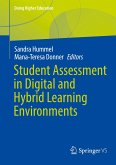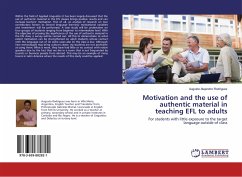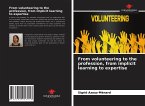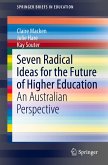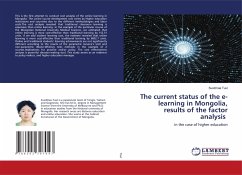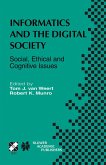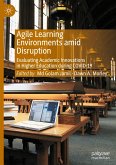The Design of Digital Learning Environments
Online and Blended Applications of the Community of Inquiry
Herausgeber: Garrison, D. Randy; Stenbom, Stefan; Cleveland-Innes, Martha F.
The Design of Digital Learning Environments
Online and Blended Applications of the Community of Inquiry
Herausgeber: Garrison, D. Randy; Stenbom, Stefan; Cleveland-Innes, Martha F.
- Gebundenes Buch
- Merkliste
- Auf die Merkliste
- Bewerten Bewerten
- Teilen
- Produkt teilen
- Produkterinnerung
- Produkterinnerung
The Design of Digital Learning Environments provides comprehensive guidelines for creating and delivering high-quality online and blended learning experiences in higher education.
Andere Kunden interessierten sich auch für
![Student Assessment in Digital and Hybrid Learning Environments Student Assessment in Digital and Hybrid Learning Environments]() Student Assessment in Digital and Hybrid Learning Environments81,99 €
Student Assessment in Digital and Hybrid Learning Environments81,99 €![Motivation and the use of authentic material in teaching EFL to adults Motivation and the use of authentic material in teaching EFL to adults]() Augusto Alejandro RodríguezMotivation and the use of authentic material in teaching EFL to adults26,99 €
Augusto Alejandro RodríguezMotivation and the use of authentic material in teaching EFL to adults26,99 €![From volunteering to the profession, from implicit learning to expertise From volunteering to the profession, from implicit learning to expertise]() Sigrid Azouz-MénardFrom volunteering to the profession, from implicit learning to expertise26,99 €
Sigrid Azouz-MénardFrom volunteering to the profession, from implicit learning to expertise26,99 €![Seven Radical Ideas for the Future of Higher Education Seven Radical Ideas for the Future of Higher Education]() Claire MackenSeven Radical Ideas for the Future of Higher Education48,99 €
Claire MackenSeven Radical Ideas for the Future of Higher Education48,99 €![The current status of the e-learning in Mongolia, results of the factor analysis The current status of the e-learning in Mongolia, results of the factor analysis]() Suvdmaa TuulThe current status of the e-learning in Mongolia, results of the factor analysis36,99 €
Suvdmaa TuulThe current status of the e-learning in Mongolia, results of the factor analysis36,99 €![Informatics and the Digital Society Informatics and the Digital Society]() Tom J. van Weert / Robert K. Munro (eds.)Informatics and the Digital Society125,99 €
Tom J. van Weert / Robert K. Munro (eds.)Informatics and the Digital Society125,99 €![Agile Learning Environments amid Disruption Agile Learning Environments amid Disruption]() Agile Learning Environments amid Disruption147,99 €
Agile Learning Environments amid Disruption147,99 €-
-
-
The Design of Digital Learning Environments provides comprehensive guidelines for creating and delivering high-quality online and blended learning experiences in higher education.
Hinweis: Dieser Artikel kann nur an eine deutsche Lieferadresse ausgeliefert werden.
Hinweis: Dieser Artikel kann nur an eine deutsche Lieferadresse ausgeliefert werden.
Produktdetails
- Produktdetails
- Verlag: Taylor & Francis Ltd
- Seitenzahl: 312
- Erscheinungstermin: 31. Januar 2024
- Englisch
- Abmessung: 254mm x 178mm
- Gewicht: 775g
- ISBN-13: 9781032159010
- ISBN-10: 1032159014
- Artikelnr.: 68712185
- Herstellerkennzeichnung
- Libri GmbH
- Europaallee 1
- 36244 Bad Hersfeld
- 06621 890
- Verlag: Taylor & Francis Ltd
- Seitenzahl: 312
- Erscheinungstermin: 31. Januar 2024
- Englisch
- Abmessung: 254mm x 178mm
- Gewicht: 775g
- ISBN-13: 9781032159010
- ISBN-10: 1032159014
- Artikelnr.: 68712185
- Herstellerkennzeichnung
- Libri GmbH
- Europaallee 1
- 36244 Bad Hersfeld
- 06621 890
Martha F. Cleveland-Innes is Professor in Graduate Education Programs at Athabasca University, Canada. She is an award-winning researcher and author in the field of distance and blended higher education. Stefan Stenbom is Associate Professor at KTH Royal Institute of Technology, Sweden. He is one of the leading scholars in the third generation of Community of Inquiry researchers. D. Randy Garrison is Professor Emeritus at the University of Calgary, Canada. He has published extensively on teaching and learning in distance, higher, and adult education contexts.
1. Introduction to the Community of Inquiry theoretical framework 2. A
Brief History of the Community of Inquiry Framework (A Personal
Recollection) 3. Evidence-based collaborative and constructivist online
design and practice 4. Teaching Presence as a Guide for Productive Design
in Online and Blended Learning 5. Design and facilitation to balance
Social, Teaching, and Cognitive Presence 6. Fostering Student Self- and
Co-regulation in a Community of Inquiry: Development of a Self-Assessment
and Praxis Tool 7. The Community of Inquiry in blended synchronous designs
8. The Community of Inquiry in international and intercultural settings 9.
Scaling the Community of Inquiry framework for MOOC design 10. Applying
Community of Inquiry in Designing Higher Education Lifelong Learning
Courses: The case of the BUFFL-project 11. Hands-on science learning using
the Community of Inquiry framework 12. Strategies to Promote Cognitive
Presence in Asynchronous Online Discussions: A 20-Year Systematic Review of
Empirical Research 13. Digital meetings guided by the Community of Inquiry
framework 14. The Community of Inquiry and Authentic Assessment: A Union of
Flexibility and Purpose15. Conclusions and further directions
Brief History of the Community of Inquiry Framework (A Personal
Recollection) 3. Evidence-based collaborative and constructivist online
design and practice 4. Teaching Presence as a Guide for Productive Design
in Online and Blended Learning 5. Design and facilitation to balance
Social, Teaching, and Cognitive Presence 6. Fostering Student Self- and
Co-regulation in a Community of Inquiry: Development of a Self-Assessment
and Praxis Tool 7. The Community of Inquiry in blended synchronous designs
8. The Community of Inquiry in international and intercultural settings 9.
Scaling the Community of Inquiry framework for MOOC design 10. Applying
Community of Inquiry in Designing Higher Education Lifelong Learning
Courses: The case of the BUFFL-project 11. Hands-on science learning using
the Community of Inquiry framework 12. Strategies to Promote Cognitive
Presence in Asynchronous Online Discussions: A 20-Year Systematic Review of
Empirical Research 13. Digital meetings guided by the Community of Inquiry
framework 14. The Community of Inquiry and Authentic Assessment: A Union of
Flexibility and Purpose15. Conclusions and further directions
1. Introduction to the Community of Inquiry theoretical framework 2. A
Brief History of the Community of Inquiry Framework (A Personal
Recollection) 3. Evidence-based collaborative and constructivist online
design and practice 4. Teaching Presence as a Guide for Productive Design
in Online and Blended Learning 5. Design and facilitation to balance
Social, Teaching, and Cognitive Presence 6. Fostering Student Self- and
Co-regulation in a Community of Inquiry: Development of a Self-Assessment
and Praxis Tool 7. The Community of Inquiry in blended synchronous designs
8. The Community of Inquiry in international and intercultural settings 9.
Scaling the Community of Inquiry framework for MOOC design 10. Applying
Community of Inquiry in Designing Higher Education Lifelong Learning
Courses: The case of the BUFFL-project 11. Hands-on science learning using
the Community of Inquiry framework 12. Strategies to Promote Cognitive
Presence in Asynchronous Online Discussions: A 20-Year Systematic Review of
Empirical Research 13. Digital meetings guided by the Community of Inquiry
framework 14. The Community of Inquiry and Authentic Assessment: A Union of
Flexibility and Purpose15. Conclusions and further directions
Brief History of the Community of Inquiry Framework (A Personal
Recollection) 3. Evidence-based collaborative and constructivist online
design and practice 4. Teaching Presence as a Guide for Productive Design
in Online and Blended Learning 5. Design and facilitation to balance
Social, Teaching, and Cognitive Presence 6. Fostering Student Self- and
Co-regulation in a Community of Inquiry: Development of a Self-Assessment
and Praxis Tool 7. The Community of Inquiry in blended synchronous designs
8. The Community of Inquiry in international and intercultural settings 9.
Scaling the Community of Inquiry framework for MOOC design 10. Applying
Community of Inquiry in Designing Higher Education Lifelong Learning
Courses: The case of the BUFFL-project 11. Hands-on science learning using
the Community of Inquiry framework 12. Strategies to Promote Cognitive
Presence in Asynchronous Online Discussions: A 20-Year Systematic Review of
Empirical Research 13. Digital meetings guided by the Community of Inquiry
framework 14. The Community of Inquiry and Authentic Assessment: A Union of
Flexibility and Purpose15. Conclusions and further directions


